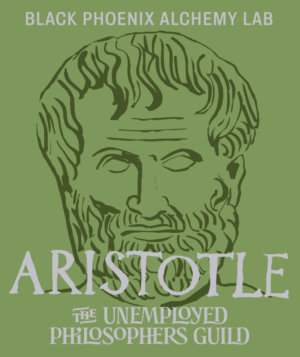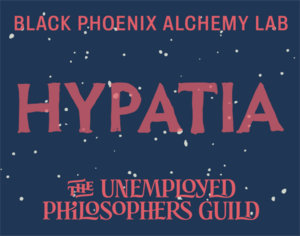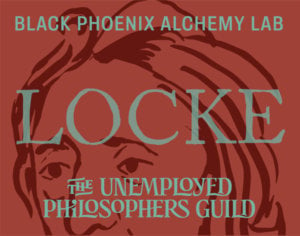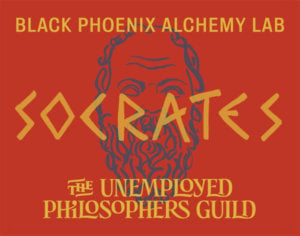The Unemployed Philosophers Guild

The origins of The Unemployed Philosophers Guild are shrouded in mystery… or maybe those are wine stains.
Early in the 4th century BCE, Socrates drank from one of our vessels. Although the UPG almost never endorses drinking poisonous hemlock, we made it look good.
Millennia passed. The Roman Empire. Attila the Hun. The Plague. Gingivitis. A couple witch hunts were in there. Kon-Tiki.
Finally, in the 1990s, two brothers in New York City’s Lower East Side inherited the mantle of the UPG at a time when a mantle was a difficult thing to pawn.
The Unemployed Philosophers Guild was reborn when these champions turned their advanced degrees, creativity, and love of paying rent toward noble ends: meeting the needs of the people for finger puppets of the great philosophers, transforming coffee mugs, and cracking up at stuff.
-
Aristotle Beard Oil
Add to cartARISTOTLE of Stagira (384 BCE – 322 BCE)
His Poetica saved the cat 23 centuries before the first screenwriting how-to book.
The history of Western logic begins with his Organon.
Aristotle studied under Plato, who studied under Socrates, and this ancient Greek beardy trinity became known as the “fathers of Western philosophy.”
The founder of the Peripatetic school (named for his custom of walking as he lectured), Aristotle systematically examined human endeavor and the natural world. Though some of his ideas were just plain inaccurate, he not only invented an early version of the scientific method, he was first to categorize similar living things by group, and sorted his treatises by topic (ethics, semantics, economics, politics, religion, zoology, biology, physics) substantially as we study and practice the arts and sciences today.
Aristotle’s writing blew away contemporaries; yet of 200 works, all that remain are a few dozen crummy sets of lecture notes and compilations by students and students of students.
We may have lost his legendary eloquence, but even the literary shadows of his original compositions illuminate our thinking a couple of thousand years later.
If you are the type who likes to stroke your beard and think or to pace and stroke your beard and think, or to pace and stroke your chin and think – for do we have incontrovertible proof he had a beard? – Aristotle will give you something to think… about your beard.
Gentlemen, see Historia Animalium, Book III, Ch. 11:
In some cases among men the upper lip and the chin is thickly covered with hair, and in other cases these parts are smooth and the cheeks are hairy; and, by the way, smooth-chinned men are less inclined than bearded men to baldness.
Ladies, see Historia Animalium, Book III, Ch. 11, a few paragraphs earlier:
Women do not grow hairs on the chin; except that a scanty beard grows on some women after the monthly courses have stopped; and similar phenomenon is observed at times in priestesses in Caria, but these cases are looked upon as portentous with regard to coming events.
Thinking about starting an argument? If you’re not starting with Aristotle, maybe you’re not doing it right.
Oman frankincense, Greek sage, and white juniper.
-
Hypatia Perfume Oil
Add to cartHYPATIA of Alexandria (c. 355 CE – 415 CE)
Hypatia of Alexandria is the earliest woman philosopher, astronomer, and mathematician whose legacy has survived. Her teaching attracted students from wealthy and influential families, including the future bishop Synesius of Cyrene, whose letters “To the Philosopher” are some of our few primary sources about Hypatia.
She succeeded her father, the Greek mathematician Theon, as head of his Neoplatonist school.
After living and teaching peacefully amidst dangerous religious conflict, Hypatia drew the ire of enemies who resented the accomplishment of a woman – and hated that a “pagan” had become the era’s preeminent astronomer and mathematician.
Math is hard.
Bishop Cyril of Alexandria needed only to spread slanderous rumors to provide sufficient pretext for the parabalani – a violent militia of Christian monks – to savagely torture and murder an unarmed scholar. Some say they hacked her to death with clay roofing tiles; some say they wielded oyster shells. Either way, the cowards were satisfied they had silenced her.
Following this atrocity, Hypatia’s work was disparaged and her writings were “lost.”
Hypatia is not forgotten.
The ancient philosopher and astronomer is memorialized on Earth (presolar meteorite fragment “Hypatia” stone), on the Moon (Hypatia crater, Rimae Hypatia), and in the heavens (main-belt asteroid 238 Hypatia).
Synesius of Cyrene Drags Athens in a Letter to his Brother
…may the accursed ship-captain perish who brought me here! Athens has no longer anything sublime except the country’s famous names! Just as in the case of a victim burnt in the sacrificial fire, there remains nothing but the skin to help us to reconstruct a creature that was once alive – so ever since philosophy left these precincts, there is nothing for the tourist to admit except the Academy, the Lyceum, and – by Zeus! – the Decorated Porch which has given its name to the philosophy of Chrysippus.
Today Egypt has received and cherishes the fruitful wisdom of Hypatia. Athens used to be the dwelling place of the wise: today the beekeepers alone bring it honor.
Rose water and a mineralic, star-dappled blend of white musk, crystalline amber, and sweet oud.
-
John Locke Perfume Oil
Add to cartJOHN LOCKE of England and France and England and Holland and England (1632 CE – 1704 CE)
English philosopher John Locke was a Great Thinker.
As with many a Great Thinker, sometimes his brilliant ideas tilted at each other, and sometimes the luminous heart of his theories of property (you are not property! you own yourself! and your labor!) proved inadequately lit – anyway, not enough to enlighten his investment in the shady business of capturing and enslaving people.
Locke could be bracingly independent. He upended convention by growing less conservative and less authoritarian with age.
In his era, the political waters could be choppy (adj. “variable, tumultuous, filled with beheadings”), and from time to time he was obliged to flee. He fled to France (1675-1679). He fled to Holland (1683-1689).
The Father of Liberalism’s ideas about natural rights and the social contract inspired many other flawed Great Thinkers, among them the framers of the Declaration of Independence and the U.S. Constitution.
To this day, we continue to perfect the ideas John Locke advocated: government by consent of the people, individual rights, tolerance, scientific and evidence-based inquiry, liberty, and reason.
John Locke was a Virgo.
New opinions are always suspected, and usually opposed, without any other reason but because they’re not already common.
A blend of 17th century grooming products and some Sexy Virgo Philosopher Leather Action: lavender pomade, a splash of Carmelite water, tonka bean, and a well-worn strop.
-
Socrates Perfume Oil
Add to cartSOCRATES of Athens (c. 470 BCE – 399 BCE)
To Socrates, “the unexamined life is not worth living.” He did his examining publicly, by elenchus, which is italics for “the question-and-answer analysis of ideas.” (We still call this “the Socratic Method” and it still bugs people.)
Socrates portrayed himself as a “gadfly” to the torpid “great and noble steed” of the state, and powerful Athenians agreed, though they were not universally grateful.
Socrates also claimed he had a mystical inner voice (his daimonion) and it dissuaded him from such deeds as seeking high office. Ineluctably, this daimonion and his many other peculiarities were weaponized by Athenians of high office.
Despite his patriotic service – as soldier, as divinely-appointed nuisance of Athens – Socrates was tried, convicted of impiety and corruption of the youth, and sentenced to death by drinking Conium maculatum, which is italics for poisonous hemlock.
Socrates remained Socrates to the last.
…I had not the boldness or impudence or inclination to address you as you would have liked me to address you, weeping and wailing and lamenting, and saying and doing many things which you have been accustomed to hear from others, and which, as I say, are unworthy of me. But I thought that I ought not to do anything common or mean in the hour of danger: nor do I now repent of the manner of my defense, and I would rather die having spoken after my manner, than speak in your manner and live.
– Plato-s ApologyInspired by anointing oils used in the philosopher’s time after partaking in public baths: orris root, ambergris accord, frankincense, olive blossom, black fig, and marjoram.



